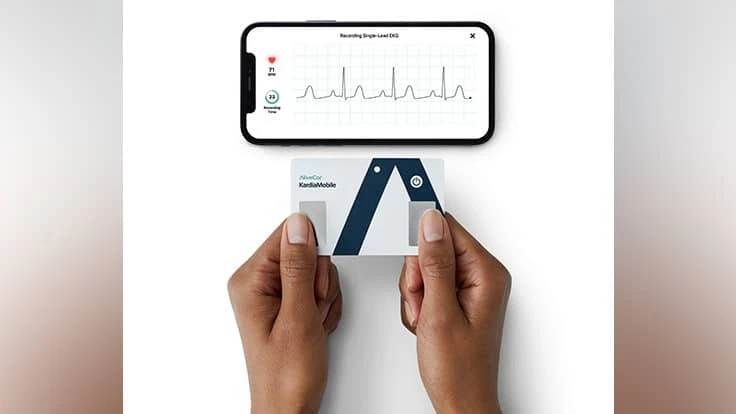
AliveCor/KardiaMobile Card
AliveCor announced the launch of KardiaMobile Card, the slimmest, most convenient personal ECG device ever created. At the size of a standard credit card, KardiaMobile Card fits easily into any wallet and delivers a medical-grade, single-lead ECG in 30 seconds. KardiaMobile Card makes history as the world's first credit-card-sized ECG ever cleared by the FDA.
"After disrupting traditional ECG monitoring with our game-changing Kardia platform, we have now achieved the unprecedented milestone of creating the first-ever credit-card-sized personal ECG," says Priya Abani, CEO of AliveCor. "KardiaMobile Card delivers the most sophisticated AI in the most convenient form factor ever, putting the power of real-time ECG analysis directly in patients' wallets and furthering our vision of becoming the 24/7 virtual cardiologist for patients when they're not in front of their physician."
KardiaMobile Card pairs with a smartphone using Bluetooth technology to detect six of the most common arrhythmias, more than any other personal ECG on the market. KardiaMobile Card users also have access to cardiologist analyses of ECGs, monthly heart health reports, and automatic sharing of ECG recordings. The device's algorithm is based on AliveCor's AI-enabled Kardia technology, which has been evaluated by more than 170 peer-reviewed studies. Designed to resist weather, water, and wear and tear, KardiaMobile Card is AliveCor's most portable and durable ECG available, allowing users to take an ECG recording anytime, anywhere.
"The availability of a personal ECG that fits in a wallet will change the face of remote cardiac monitoring for patients and healthcare professionals alike," says Darria Long Gillespie, MD, emergency physician and Clinical Assistant Professor of Emergency Medicine, AliveCor Ambassador, and founder of the TrueveLab. "As someone who lives with ventricular tachycardia and has treated patients with arrhythmias, I know how critical it is to access accurate ECG recordings in real time. KardiaMobile Card has made this technology even easier to access, and it has quickly become the most valuable card in my wallet."
KardiaMobile Card comes at a critical moment when both heart arrhythmias and hypertension, a risk factor for atrial fibrillation and other arrhythmias, are becoming more common.1,2 These cardiac conditions have massive economic impacts. Hypertension costs the U.S. healthcare system an estimated $316 billion annually.3 Further, it is estimated that 80% of all cardiovascular disease is preventable,4 which highlights the importance of putting real-time data within reach of patients.
KardiaMobile Card comes with 1-year access to KardiaCare, the heart health service that offers more than 130,000 members a suite of advanced features to help them better manage and understand their heart health. KardiaCare includes ECG evaluations by board-certified cardiologists, monthly reports that summarize ECG and blood pressure data, automatic sharing of ECG recordings with caregivers, and the ability to detect a broader range of heart conditions.
1. Global epidemiology of atrial fibrillation: An increasing epidemic and public health challenge. Int J Stroke. 2021 Feb;16(2):217-221.
2. American Heart Association. U.S. Adults' blood pressure levels increased during the COVID-19 pandemic. https://newsroom.heart.org/news/u-s-adults-blood-pressure-levels-increased-during-the-covid-19-pandemic
3. Wierzejska E et al. A global perspective on the costs of hypertension: a systematic review. Arch Med Sci. 2020;16(5):1078–1091. doi: 10.5114/aoms.2020.92689.
4. Virani SS et al. Heart Disease and Stroke Statistics—2020 Update: A Report From the American Heart Association. Circulation. 2020;141:e139–e596. doi: 10.1161/CIR.0000000000000757.
Latest from Today's Medical Developments
- Arcline to sell Medical Manufacturing Technologies to Perimeter Solutions
- Decline in German machine tool orders bottoming out
- Analysis, trends, and forecasts for the future of additive manufacturing
- BlueForge Alliance Webinar Series Part III: Integrate Nationally, Catalyze Locally
- Robot orders accelerate in Q3
- Pro Shrink TubeChiller makes shrink-fit tool holding safer, easier
- Revolutionizing biocompatibility: The role of amnion in next-generation medical devices
- #56 Lunch + Learn Podcast with Techman Robot + AMET Inc.





